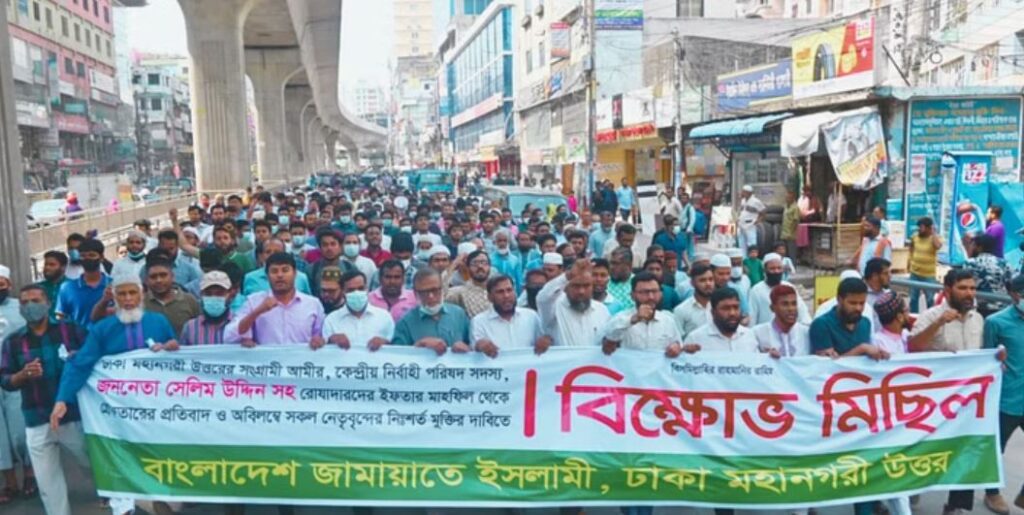When Dr. Muhammad Yunus-led Interim Government in Bangladesh revoked the ban imposed on Bangladesh Jamaat-e-Islami, no one was shocked. It was expected. But now the question being asked is whether the fundamentalist Islamic outfit will capture the power of the country along with the Bangladesh Nationalist Party. It is pertinent to keep in mind the earlier relations between the two organizations, the fall of Awami League and the recent success of the students’ movement that forced Sheikh Hasina to quit and flee the country.
Bangladesh Islami Chhatra Shibir Behind Student Movement?
When thousands of students took to the streets demanding to scrap the quota system that allowed 30% reservation to the descendants of ‘Muktir Jodhha’ (freedom fighters), those who participated in the liberation war against Pakistan in 1971, people from different walks of life joined it. But contrary to the public perception, political analysts believe that the movement was hijacked by Bangladesh Islami Chhatra Shibir, the student wing of Jamaat-e-Islami.
Chhatra Shibir Develops Deep Roots
It is evident by the fact that the student outfit of Bangladesh Jamaat e-Islami has roots in the campus and hostels of Chittagong College, University of Chittagong, University of Dhaka, Rajshahi University, Islamic University, Jagannath University, Begum Rokeya University, and Carmichael College, etc. The student movement that spread across the country was organised and led by the student leaders who emerged from these universities. Islami Chhatra Shibir developed its roots in these universities years back in a well-planned manner.
Chhatra Shibir Rejects Supreme Court Verdict
Secondly, after the Supreme Court scrapped the quota system and reduced the quota for the Mukti Joddha’s descendants to 10%, the government immediately accepted it and announced that the required notification would be issued as soon as possible. The student movement should have come to an end when their demand was met.
March To Dhaka
Thirdly, Shibir rejected the Supreme Court decision and asked Prime Minister Sheikh Hasina to quit. Even after the main demand of the student movement was met, the student leaders called for a ‘March To Dhaka.’ This march was so aggressive and violent that thousands of people stormed the prime minister’s residence, ‘Gana Bhawan’, and looted almost everything.
Bangladesh Jamaat-e-Islami On Rampage
Political analysts believe, most of the student leaders were from the student wing of Jamaat-e-Islami, with the sole aim of pulling down the government. The demonstrators who participated in the march and stormed ‘Gana Bhawan’ were mainly activists of the Bangladesh Jamaat-e-Islami.
It also becomes clear if the behavior of the marauding crowd that vandalised the statues and images of Sheikh Mujibur Rehman is studied. If reports are to be believed, most of them were members of the Islamic outfit.
Against 1971 Liberation War
The museum dedicated to the 1971 Liberation War against Pakistan was put on fire and gutted completely. The same student leaders put pressure on the interim government to declare that there would be no holiday on August 15, the martyrs’ day when Sheikh Mujib and his family members were assassinated. These activists also allegedly stopped people from going to the residence of Mujibur Rehman to pay homage on August 15.
Can any student movement resort to such activities even after their main demand is fulfilled?
4 Jamaat-E-Islami Men In Interim Govt
Muhammad Yunus-led ‘apolitical’ interim government has four members from the Islamist outfit and three from the BNP.
Bangladesh Jamaat-e-Islami has proved that it can raise a strong outfit based on the ideology of fundamental Islam that wants to establish Shariat laws in the country. It has also proved that it can ride on the wave of public anger, mobilize people from different walks of life and lead a movement that can sustain a long struggle, bear the brunt of the crackdown by the police and security force and sustain it for a long time despite all odds.
When Will Elections Be Held?
The only missing link is their ability to channel this mass base into votes, contest and win elections. Though Bangladesh Army Chief General Waker uz Zaman promised to hold general elections within three months, political observers believe it is most unlikely to happen. Leaders of the student movement have demanded reforms in police, civil service, bureaucracy, and other sectors. It will take time. Secondly, it is most likely that the army will relinquish its power so quickly and easily, considering the earlier experiences of army rules. So, the general elections are not likely to be held now.
Jamaat-E-Islami Buys Time
It will give Bangladesh Jamaat-e-Islami time enough to reach out to India and other democratic forces like the US and the European Union. It will also get enough time to consolidate itself and convert the clerics into party workers who can learn how to spearhead political campaigns and election management of elections.
Bangladesh: Next Islamic Govt?
Earlier, both Jamaat-e-Islami and the BNP joined hands to fight the election together. Both of them are anti-Mujibur Rehman and anti-Shiek Hasina, anti-India, and pro-Pakistan. The only difference between them is that, unlike Jamaat, the BNP does not support a Shariat-based Islamic state. Will Jamaat ride to power joining hands with the Khalida Zia-led party?
Current Version
Aug 30, 2024 19:27
Written By
Pramode

